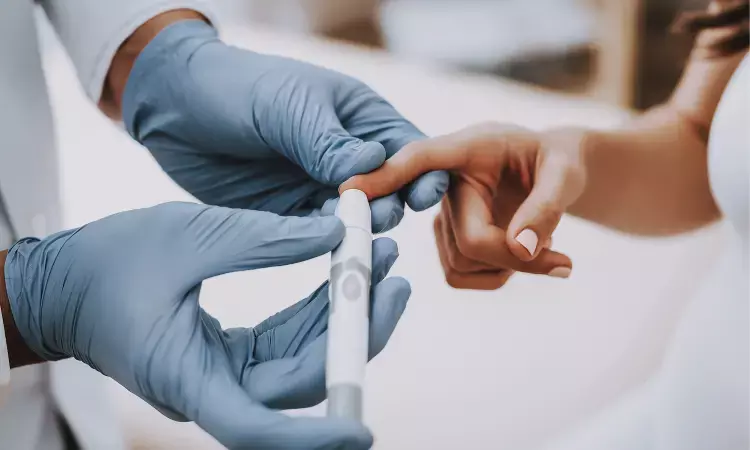- Home
- Medical news & Guidelines
- Anesthesiology
- Cardiology and CTVS
- Critical Care
- Dentistry
- Dermatology
- Diabetes and Endocrinology
- ENT
- Gastroenterology
- Medicine
- Nephrology
- Neurology
- Obstretics-Gynaecology
- Oncology
- Ophthalmology
- Orthopaedics
- Pediatrics-Neonatology
- Psychiatry
- Pulmonology
- Radiology
- Surgery
- Urology
- Laboratory Medicine
- Diet
- Nursing
- Paramedical
- Physiotherapy
- Health news
- Fact Check
- Bone Health Fact Check
- Brain Health Fact Check
- Cancer Related Fact Check
- Child Care Fact Check
- Dental and oral health fact check
- Diabetes and metabolic health fact check
- Diet and Nutrition Fact Check
- Eye and ENT Care Fact Check
- Fitness fact check
- Gut health fact check
- Heart health fact check
- Kidney health fact check
- Medical education fact check
- Men's health fact check
- Respiratory fact check
- Skin and hair care fact check
- Vaccine and Immunization fact check
- Women's health fact check
- AYUSH
- State News
- Andaman and Nicobar Islands
- Andhra Pradesh
- Arunachal Pradesh
- Assam
- Bihar
- Chandigarh
- Chattisgarh
- Dadra and Nagar Haveli
- Daman and Diu
- Delhi
- Goa
- Gujarat
- Haryana
- Himachal Pradesh
- Jammu & Kashmir
- Jharkhand
- Karnataka
- Kerala
- Ladakh
- Lakshadweep
- Madhya Pradesh
- Maharashtra
- Manipur
- Meghalaya
- Mizoram
- Nagaland
- Odisha
- Puducherry
- Punjab
- Rajasthan
- Sikkim
- Tamil Nadu
- Telangana
- Tripura
- Uttar Pradesh
- Uttrakhand
- West Bengal
- Medical Education
- Industry
Living alone does not increase death, stroke, and MI risk in diabetes patients

China: Living alone does not increase the risk of hypoglycemia and cardiovascular events (cardiac death, non-fatal stroke, or non-fatal MI) in patients with type 2 diabetes mellitus (T2DM), claims a recent study in Frontiers in Public Health.
The patients living alone, however, had higher Hb1AC levels compared to those living with others. Therefore, effective blood sugar control should be considered regardless of the patient's living arrangements.
Previous studies have shown that living alone is associated with reduced social support. However, there is not much information on the relationship between living alone and cardiovascular events or hypoglycemia in T2DM patients. Zhaowei Zhu, The Second Xiangya Hospital, Central South University, Changsha, China, and colleagues report a post-hoc analysis of the "Action to Control Cardiovascular Risk in Diabetes (ACCORD)" study.
The team evaluated whether living alone increases the risk of hypoglycemia and CVD among patients with T2DM. The hazard ratios (HRs) for the adverse health events selected as primary endpoints in the study participants were compared using the Cox proportional hazard models; these were compared between those living alone and those living with others.
The primary outcomes included hypoglycemia requiring medical assistance (HMA), hypoglycemia requiring any assistance (HAA), and major cardiovascular events (MACEs, including cardiac death, non-fatal myocardial infarction (MI), and non-fatal stroke). 10,249 participants (2,078 living alone) were included in the study with a follow-up period of 4.91 ± 1.22 years.
Based on the study, the researchers reported the following:
- After a multivariable adjustment, the risk of HAA, HMA, and MACEs did not differ significantly between participants living alone and those living with others (HAA, HR: 0.88; HMA, HR: 1.11; MACEs, HR: 0.98).
- Participants living alone had higher levels of glycated hemoglobin in the middle follow-up period than those living with others.
The researchers concluded, "clinicians should consider an effective blood glucose control regardless of their living arrangement."
Reference:
Zhu Z, Peng Z and Xing Z (2022) Living Alone Is Not Associated With Cardiovascular Events and Hypoglycemia in Patients With Type 2 Diabetes Mellitus. Front. Public Health 10:883383. doi: 10.3389/fpubh.2022.883383
Dr Kamal Kant Kohli-MBBS, DTCD- a chest specialist with more than 30 years of practice and a flair for writing clinical articles, Dr Kamal Kant Kohli joined Medical Dialogues as a Chief Editor of Medical News. Besides writing articles, as an editor, he proofreads and verifies all the medical content published on Medical Dialogues including those coming from journals, studies,medical conferences,guidelines etc. Email: drkohli@medicaldialogues.in. Contact no. 011-43720751


